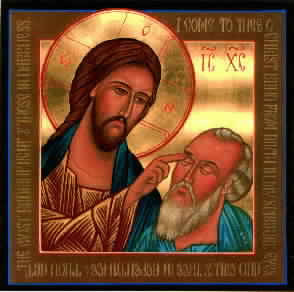|
|||
|---|---|---|---|
| This weekly bulletin insert complements the curriculum published by the Department of Christian Education of the Orthodox Church in America. This and many other Christian Education resources are available at http://dce.oca.org. | |||
|
In John 9 we read the story of a blind man healed by Jesus Christ. The first words of the passage remind us of a basic Christian teaching: Things do not happen because of "karma"--a word that is thrown around by many people today. They happen in order that God's will may be fulfilled. We know this from Jesus' own words. The disciples ask Him why the man has the misfortune of being blind—was it his sin or his parents' that caused it? They are expressing an idea that is similar to karma, the idea that adversity in this life is due to some sin in a former life. Jesus declares a firm "no" to this. He tells the disciples that "it was not that this man sinned, or his parents." Rather, the man was born blind so that God's works could be openly shown (manifested) in him. The rest of the passage shows us how this happens. Try as they may, the Pharisees and some hostile onlookers can't destroy the power of the miracle, and the healed man comes to worship Jesus Christ as Lord. No doubt his example encouraged some who were present that day to do the same. So through his blindness he came, and brought others, to faith in Jesus Christ as God. As Jesus said, his misfortune was the means by which God's works were manifested. But there are many ways of facing adversity. The blind man is told to walk to the pool of Siloam, with muddy clay on his eyes—clay formed and placed there by Christ. Jesus had healed others with a word, not making them stumble through the streets with eyes covered in mud. Why, the blind man might have asked, couldn't he be healed without having to make himself conspicuous in public? What certainty could he have that it would be "worth it" in the end? But the blind man didn't ask those questions. He was faithful and obedient when faith and obedience were not easy. He was ready to trust God to work in His own way—to trust, even when not necessarily understanding. At Pascha we witnessed the greatest example of faith and obedience with its wonderful result: the death, and then the resurrection, of Jesus Christ. Those two events still puzzle some people. They cannot understand why the Son of God would demean Himself with a brutal death. They ask why God would bring salvation in this way. 
But again Jesus Christ gives the answer. In Luke's 24th chapter He reminds the disciples of everything written in the Old Testament about Him. Those writings included prophecies of pain and death, but also of repentance and forgiveness for people everywhere. Out of that greatest of all adversities, human redemption would come. It had to happen that way, He tells His followers, in order that "everything...might be fulfilled." |
|||
